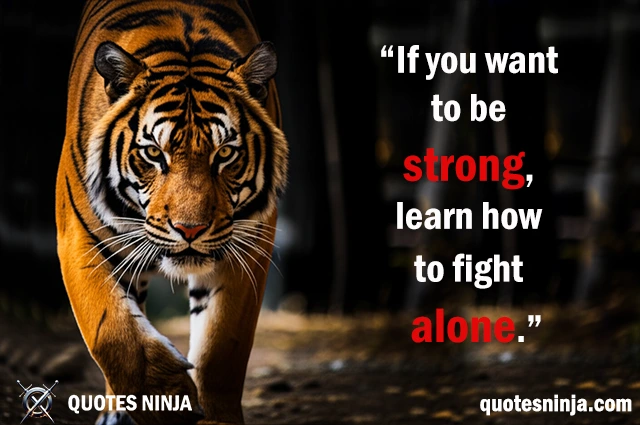
Wisdom Quote: “If you want to be strong, learn how to fight alone” means that true strength—emotional, mental, or even spiritual—comes from being able to handle life’s challenges without always relying on others.
Deeper Meaning of Wisdom Quote
Here is the breakdown of the quote “If you want to be strong, learn how to fight alone.”
- “Fight alone” symbolizes facing your struggles, pain, failures, or growth on your own.
- It doesn’t mean you reject help or companionship—but rather, you become self-reliant.
- Life won’t always offer support, so learning to stand your ground even when you’re alone builds resilience, independence, and inner strength.
- In solitude, you often find your true capabilities—without applause, without backup.
Here’s a story inspired by Wisdom Quote “If you want to be strong, learn how to fight alone.”
Wisdom Story: “The Island Within“

Crash and Isolation:
The plane went down in a roar of fire and wind. One moment, Chuck Noland sat buckled in, reviewing delivery schedules in his head. The next, cold seawater crashed around him as he clung to a life raft, coughing, panicked, and utterly alone. The FedEx systems analyst had always lived by deadlines, structured meetings, and constant connectivity. But now, stripped of all that, he stared at the endless ocean, not a soul in sight.
At first, survival felt impossible.
Chuck washed ashore on a remote island, bruised and broken. His mind screamed for help, for someone—anyone—to find him. Yet as hours turned into days, and days into weeks, reality settled in like a weight on his chest. No rescue came. No voices called his name. Just waves, wind, and the indifferent sun.
Initially, he resisted. He shouted at the sky, cursed the sea, and cried until he couldn’t anymore. However, time has a strange way of revealing truths. Eventually, Chuck realized no one was coming. If he wanted to live, he had to fight alone.
Thus began his transformation.

Realization on the Shore:
He scavenged what the wreck had thrown up—parcels, plastic, scraps of cloth. Ironically, in his corporate world, these had once been inventory. On the island, they became tools of survival. Slowly, with trembling hands and blistered feet, Chuck taught himself to fish, to build shelter, to make fire without a lighter. Each skill carved strength into him. Not the kind you lift in gyms or display in boardrooms—but the quiet kind. The kind that grows when there’s no applause, no praise, only necessity.

Wilson and Loneliness:
Yet survival was more than food and fire.
Isolation clawed at his mind. Chuck had no one to talk to, no one to reassure him that he mattered. That’s when he found Wilson—a volleyball, yes, but more than that, a lifeline to his sanity. Chuck painted a face on it and spoke to it like an old friend. To an outsider, it may have seemed absurd. But to Chuck, Wilson became a companion that helped him process fear, loss, and pain. Still, deep down, he knew—Wilson couldn’t save him. This battle was his alone.
Over the years, Chuck’s body hardened. His muscles adapted. His eyes scanned the horizon with the sharpness of a predator. But it was his mind that changed the most. He no longer feared being alone. In fact, solitude became a forge. Each passing season tempered his spirit like steel in fire.
One morning, after four long years, the tide offered something new—a piece of a portable toilet. Flimsy as it seemed, to Chuck it was hope in plastic form. Driven by instinct and determination, he crafted a raft. The ocean loomed wide and unforgiving, yet he didn’t hesitate. The island had taught him one thing: waiting wouldn’t save him. Action would.

The Final Escape:
Days at sea tested him more than the island ever did. He battled storms, dehydration, and despair. At one point, Wilson floated away, torn from the raft. Chuck screamed, reaching for him with every ounce of strength. But the sea took Wilson, and with him, a part of Chuck’s soul. Still, Chuck pressed forward—alone.
Finally, a cargo ship spotted him. Rescue, at last. But it wasn’t triumph he felt—it was quiet disbelief. After everything, he had survived.
Not because someone saved him. Not because luck intervened. But because he had fought alone. He had built strength not from comfort, but from hardship. Not from company, but from solitude.
Back in the real world, Chuck struggled to reintegrate. His fiancée had moved on. His old life no longer fit. Yet he no longer feared the unknown. He had faced the most brutal test imaginable—and endured.

Return and Reflection:
Now, when Chuck looks at the ocean, he doesn’t see isolation. He sees the place where he discovered his strength. And though he stands among people again, he carries within him a lesson most never learn:
True strength doesn’t come when others stand beside you. It comes when you stand alone—and choose to keep going.
Here is the ending of wisdom story from the quote “If you want to be strong, learn how to fight alone.”
Moral of the Story:
True strength is not built through comfort or constant support from others. It’s forged in solitude—when you’re forced to face your fears, adapt, and survive on your own. Only by learning to fight alone do you discover the resilience, courage, and inner power that were always within you.
In other words: When life leaves you alone, don’t break—build.
To explore more on stories and dive into related ideas, be sure to check out the other posts where we cover all sort of stories related to quotes. Stay tuned for more…..
To explore more on quote topics, be sure to check out the other topics where we cover all categories of quotes. Stay tuned for more…..

